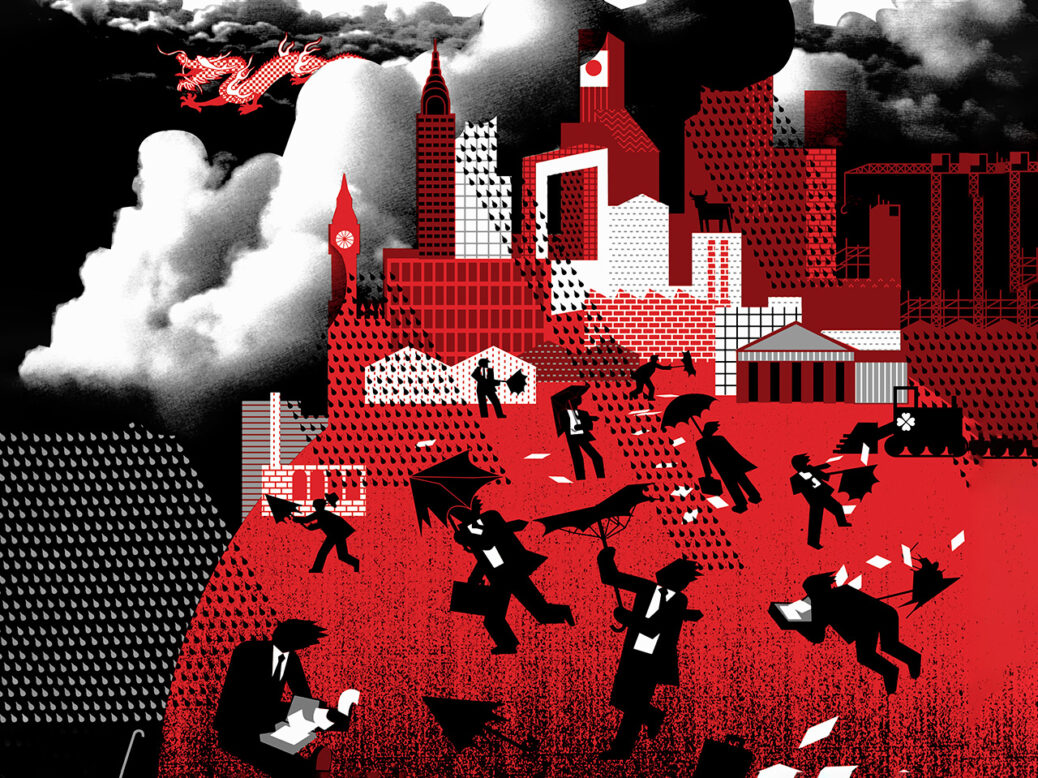
As an illustration of how geopolitics has hit globalisation, the image of an oversized balloon being shot down by a missile is hard to beat. The permafrost in US–China relations and the Russia-Ukraine war have brought to an end an era that started a little over 30 years ago. I call it the age of hyper-globalisation. The irony is that it is ending where it started – with a world divided into two camps, their borders cutting right through Europe.
The word “deglobalisation” is too crude to capture what is going on. We are still trading with one another, and will continue to do so. Commentators who argue that globalisation is alive and well, such as the historian Niall Ferguson, tend to focus too much on trade. As a percentage of economic output, global trade peaked just before the global financial crisis, and has been moving sideways ever since.
[See also: Rishi Sunak’s inflation promise is absurd – and the electorate will not forgive him]
Globalisation’s distinctive feature is not trade but interdependence. If you want to understand how globalisation works under the hood, it is best not to look at the flow of goods but of money that pays for them and of labour that makes them.
Since the 1990s China has become more closely integrated into the global economy. It has provided the world with an ever-increasing supply of cheap labour, and China’s development model is based on large industrial export surpluses. These pile up in the form of foreign reserves held abroad in dollars and euros.
The US, meanwhile, has been the system’s banker. By running large deficits against the rest of the world, the US absorbed China’s – and Europe’s – excess savings. Those financial flows contributed to low global interest rates and to investment. It also helped keep inflation low for decades. Our higher inflation today is clearly related to the end of the virtuous cycle that underpinned hyper-globalisation.
The UK’s experience is a mini version of hyper-globalisation. The end of the Cold War and the expansion of the EU brought Russian oligarchs and Polish plumbers, raised investment and lowered wages and inflation – it also contributed to Brexit.
Geopolitics is intruding. The recent US interception of a suspected Chinese spy balloon is reminiscent of similar incidents during the Cold War. The West has imposed sanctions on Russia. The US has previously placed sanctions on Huawei, the Chinese mobile-phone maker; recently, it blocked high-performance semiconductor exports to China. The US has co-opted the Netherlands into stopping ASML, a Dutch maker of lithography equipment, exporting its next-generation machine to China. Lithography machines are critical in the production of high-end semiconductors – the kind you find in rockets and missiles.
Unfortunately for those who believe in the power of sanctions, the one part of globalisation that is still working well is the grey market. Mercedes-Benz cars and iPhones are still freely available in Russia through grey imports from Kazakhstan. Sanctioned goods have become a fashion statement in Russia. China is helping Russia to channel oil exports to world markets. The West overestimated the effects of economic sanctions on Vladimir Putin’s ability to wage war, but underestimated the effects they would have on globalisation. It is naive to think that you can deprive a country with the resources of China from critical technology. If you sanction both Russia and China, do not be surprised that they are forming a strategic alliance.
[See also: How two businessmen wrote the rules of globalisation]
China and Russia are part of a wider group of countries previously known as the “Brics”. The acronym stems from the early 2000s and denotes the five high-growth tiger economies of that period. The other three are India, South Africa and Brazil. They were supposed to be the pillars of our globalised future, along with the US and Europe. What’s happened since is that the five are not playing in our team any more.
The Brics are united in their refusal to adopt Western sanctions against Russia. They are now in talks to create a joint reserve currency. I struggle to see the economic case, but it makes political sense. A joint reserve currency would make them less vulnerable to US financial sanctions. Through the dominant role of the dollar as the world’s largest reserve and transaction currency, the US exerts power over global finances. A Brics reserve currency would reduce that power. Russia and Iran recently announced that they have developed an alternative to the Swift intra-bank communication system (from which Russian banks have been banned). Russia and China have been developing their own payment system. Cryptocurrencies and blockchain tech offer further opportunities for decoupling from the West.
The Brics are also undertaking steps to become less dependent on the Western-run financial institutions – the IMF and the World Bank, whose chiefs are always Europeans and Americans respectively. It is our globalisation, not theirs.
The West, too, wants to become less dependent on the East. The pandemic made us aware of vulnerable supply chains. Russia’s war has revealed Europe’s strategic dependence on Russia gas and oil. EU countries are more security-conscious.
The whole world has fallen out of love with hyper-globalisation. The Nord Stream pipelines have been destroyed and will never be rebuilt. Chinese firms are removing investment from European ports, and countries are starting to friend-shore what used to be global supply chains. We are still trading with one another, and will continue. But we are going to be a touch less global, and more regional. Like a hot air balloon, globalisation, too, has deflated.
[See also: As globalisation fragments, politics is again reigning supreme over economics]
This article appears in the 08 Feb 2023 issue of the New Statesman, Silent Sunak






